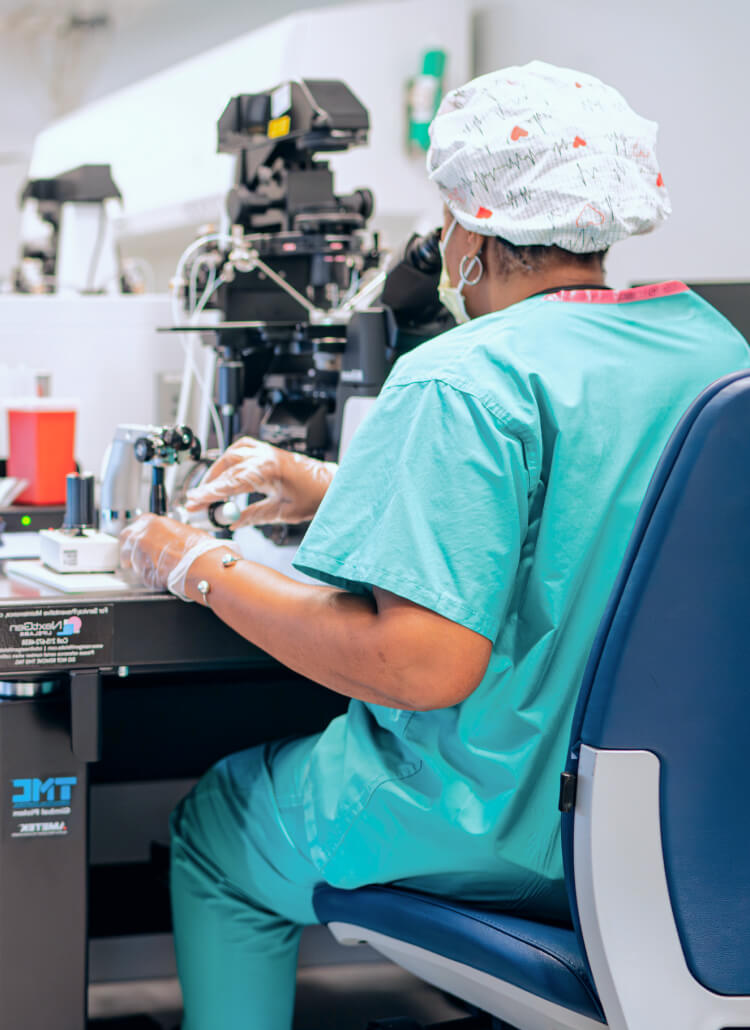Preimplantation Genetic Testing
Preimplantation genetic testing (PGT) refers to genetic testing performed on an embryo in the early stages of development. This testing identifies genetic abnormalities and chromosomal conditions, including cystic fibrosis, Tay-Sachs disease, hemophilia, and more. At NYU Langone Fertility Center (NYULFC), our world-class team tests for genetic disorders and other abnormalities in our state-of-the-art laboratory.
Leaders in PGT
At NYULFC, we proudly recognize our program director, Dr. James Grifo, former president of the Society for Assisted Reproductive Technology, as a pioneer in PGT. In 1992, he performed the first embryo biopsy that led to a live birth in the United States. Today, our expert team performs PGT on more than 75% of the embryos created during traditional in vitro fertilization (IVF) cycles.
We’re proud to have brought over 12,000 babies and counting into the world. Our success is due to our exceptional physicians, dedication to patient-centered care, and investment in the latest fertility technology. NYULFC’s embryology lab is one of the leading labs in the world, consistently achieving high success rates year after year. We prioritize personalized care for each patient and pay close attention to detail. Our dedicated staff is highly skilled and has years of embryology lab experience.
The PGT Process
Our skilled embryologists remove a small number of cells from the developing embryo, a process called an embryo biopsy, to test them for abnormalities. The embryos are frozen and stored onsite while the sample cells are thoroughly analyzed and tested at our lab. There are three different types of PGT testing: preimplantation genetic testing for aneuploidy (PGT-A), preimplantation genetic testing for structural rearrangements (PGT-SR), and preimplantation genetic testing for monogenic disorders (PGT-M).
We recommend PGT for patients undergoing IVF as well as individuals or couples with one or more of the following:
-
Family history of genetic disease
-
Multiple unsuccessful IVF attempts
-
Recurrent miscarriage
-
A history of genetically abnormal pregnancies
Preimplantation Genetic Testing for Aneuploidy
Chromosomes are the structures found within cells that contain genetic material (DNA). Normally, chromosomes come in 23 pairs. PGT-A helps us identify embryos with too many or too few chromosomes or structural defects.
There are four possible results from PGT-A testing: euploid, aneuploid, mosaic, and inconclusive.
-
Euploid: This is a normal result and means that we detected 23 pairs of chromosomes in the embryo culture. These embryos are most likely to result in a live birth and have the lowest chance of miscarriage.
-
Aneuploid: This is an abnormal result that means we detected at least one chromosomal abnormality in the embryo culture. Aneuploid embryos rarely result in healthy pregnancies, so we don’t recommend transferring them.
-
Mosaic: This result means there is some risk of extra, missing, or damaged chromosomes in some, but not all, cells in the embryo culture. Embryos with mosaic results may result in healthy live births but aren’t typically as successful as euploid embryos. Before initiating a frozen embryo transfer (FET) cycle with a mosaic embryo, we require a consultation with our genetic counselor.
-
Inconclusive: Inconclusive results occur in approximately 2% of embryos and means that our genetic testing laboratory was unable to obtain a clear result from the embryo culture. It doesn’t necessarily indicate a problem with the embryo; it’s simply a known limitation of testing a small amount of genetic material.
At NYULFC, our live birth rate from PGT-A screened embryos exceeds 50%, regardless of female age at egg retrieval. Please note, however, that the incidence of genetic abnormality increases as women age. Embryos created from eggs retrieved while a woman is in her 20s and early 30s have a 30-50% chance of exhibiting an abnormal result, while embryos created from eggs retrieved after a woman reaches the age of 40 increases to 70-90%.
Preimplantation Genetic Testing for Structural Rearrangements
PGT-SR is utilized by individuals diagnosed with a balanced translocation, inversion, or other type of chromosomal rearrangement. In these situations, PGT-SR can improve the chances of a successful pregnancy and lower the risk of miscarriage by selecting embryos that have the correct amount of chromosomal material.
Preimplantation Genetic Testing for Monogenic Disorders
PGT-M is used by individuals or couples at high risk of having a pregnancy with a specific inherited disease.PGT-M is typically feasible for any condition for which a specific genetic mutation has been identified in a person undergoing IVF, including cystic fibrosis, hereditary breast and ovarian cancer syndrome (BRCA1 or BRCA2), fragile X syndrome, Huntington’s disease, Marfan syndrome, Tay-Sachs disease, spinal muscular atrophy, and sickle cell anemia.
Preimplantation Genetic Testing: FAQs
-
An IVF cycle with PGT starts at $15,150. Please note, this price doesn’t include the cost of fertility medications, anesthesia, lab fees, or products and services provided by third parties (i.e., a gestational carrier or egg donor).
Learn more about financing options at NYULFC.
-
After the embryos have developed for 3-5 days, our fertility specialists will biopsy them and analyze the culture of cells in our state-of-the-art laboratory. This testing takes approximately 10 days to complete.
-
Information gathered during PGT can be used to diagnose genetic abnormalities in embryos with a 98% rate of accuracy.
-
Our fertility specialists will discuss the quality of each embryo with you to determine which one is best to transfer. Once an embryo is chosen, you can begin your FET cycle.
Learn More About Preimplantation Genetic Testing at NYULFC
NYULFC conducts PGT testing in our state-of-the-art laboratory, allowing us to transfer the embryo most likely to result in a successful pregnancy. Contact us today if you have any questions about the PGT process or whether this testing is right for you.



